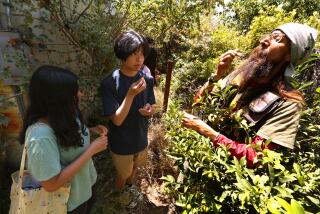Green Stocks : Local brokerages are nurturing an interest in investments that do something good for the environment as well as for other causes.
Ojai is famous for nurturing creativity. But painting, poetry and pottery aren’t the only forms creativity takes.
I recently encountered an Ojai native, Suzanne Harvey, who went through Ojai Valley School and went on to apply her locally honed values to the Wall Street stock market. She has become an expert in stocks that do something good for the environment and other causes.
In a column last summer, I reported that local stockbrokers will cooperate if you want to tailor your investments to fit your conscience--environmental or otherwise. At that time, environmentally correct stocks were yielding about 2% profits. Now they’re up to over 4%--in some cases 10%. According to Harvey and other experts I consulted, yields are above the bank passbook rate.
Following a sojourn at UC Berkeley, Harvey became the director of the Social Investment Research Service, at a major brokerage house, Prudential Securities.
“Clients want to invest in companies that reflect their own beliefs and values,” she said by phone from Prudential Securities’ Washingtion office.
“Client inquiries range from the most conservative to the most liberal . . . from product quality to weapons contracts, contraception, animal rights and the environment.”
Harvey, who can be reached by calling the Prudential Securities office in Thousand Oaks, was hired in 1985 to “screen” stock from clients who call in from around the country.
“The Exxon Valdez spill heightened people’s awareness about the environment. And with the fall of communism people have stopped worrying about things abroad and have focused their attention homeward.”
OK, so now we have determined that we want to be good environmental citizens by owning the right stocks. The problem is, we don’t know exactly what a stock like that would be.
I’ll be the first to admit that I thought it would be stock of a company that comes in and cleans up after a factory or refinery has left a big mess and then skipped town. Those are called “remediation” companies.
Nora Goldstein, executive editor of the magazine IN Business told me: “The clean-up stocks like Waste Management aren’t performing that well. The growth is in new forms of energy production; new farming technology like integrated pest management; new transportation and the new kind of manufacturing technology, which is ‘zero-load,’ using raw materials so efficiently there’s no waste or pollution.”
Her magazine publishes a list annually of 10 top environmentally-correct companies, most of whom have stock that is publicly traded. A nearby example for 1992 is the Wasco firm just north of Ventura County that grows cotton organically for Levis and Esprit.
Natural Cotton Colours Inc. is a company that cleans up its workplace beforehand, so to speak. They use no nasty chemicals in the growing process that might be left in the soil or wash into the local water supply.
For the last three years, another smart woman on Wall Street, Amy Domini, has been tracking the performance of stocks she deems environmentally correct. About half the well-known Standard & Poor index of 500 stocks survived her “screen.” She got rid of the rest and added some she found elsewhere that fit her environmental standards.
So what would have happened if you or I had bought the companies on her list versus choosing from the entire S&P; index?
The answer is interesting. According to a recent investigation by an international stock data firm (Barra Inc.) headquartered in Berkeley, $100 invested in the S&P; list in 1990 would have turned into $137 by now. The Domini Index would have gotten you $146.
Barra’s spokeswoman Nancy Pilotte voiced the obvious: “You don’t have to hurt your return to invest your conscience.”
If all this seems remote from Ventura County, please know that one of the stocks being recommended by the green-screen team--environmental stock advocates--on Wall Street is that of a company active in our county.
Dames and Moore, a nationwide engineering firm, is a stock recently bought for inclusion in a green mutual fund called New Alternative. They earn their money--and money for their stockholders--by providing environmental engineering expertise so that major projects are not harmful to the citizenry and scenery hereabout.
Simi Valley, Oxnard, Port Hueneme, Seacliffe and Mussel Shoals are the scene of recent projects they advised on. The Freeman Diversion project, which added 10% to our water supply by getting local water utilities into recycling business, is the most visible example.
FYI
Readers interested in investments that help the planet but still pay a decent return should consult “The Social Investment Almanac,” edited by Kinder, Lydenberg and Domini. Published by Henry Holt, its expensive at $50. But its 900 pages should provide information that can be used throughout the new Clinton Administration in Washington. Check local bookstores or call (800) 488-5233.
Locally, Prudential Securities in Thousand Oaks, 495-2525, provides advice on “environmentally screened” stocks if you ask to be put in touch with their Social Investment Research expert in Washington.
More to Read
Inside the business of entertainment
The Wide Shot brings you news, analysis and insights on everything from streaming wars to production — and what it all means for the future.
You may occasionally receive promotional content from the Los Angeles Times.










